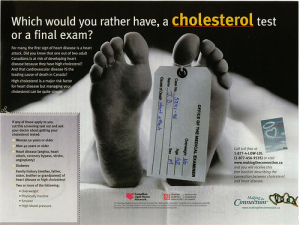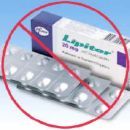Do statins prevent or promote cancer?
The Editor, Current Oncology December 24, 2007
In their commentary, Drs. Takahashi and Nishibori1 discuss putative antitumour effects of statins. However, prospective data suggest that statins actually increase cancer in certain segments of the population. Additionally, new findings regarding the immunomodulatory effects of statins may explain the mechanism by which that increase occurs2.
Statins increase the number of regulatory T cells (Tregs) in vivo by inducing the transcription factor forkhead box P32. Although that increase may be beneficial in stabilizing atherosclerotic plaque by reducing the effector T-cell response within the atheroma3, it might impair both the innate4 and adaptive5 host antitumour immune responses. Not surprisingly, the number of Tregs present in many solid tumours correlate inversely with patient survival6.
Indeed, analysis of large randomized statin trials demonstrate a highly significant (p = 0.009) inverse association between achieved low-density lipoprotein cholesterol levels and cancer7. Close inspection of statin trials reveal the specific populations at risk for the development of incident cancer with statin treatment. These include the elderly8–10 and people with a history of breast or prostate cancer11,12. Furthermore, statin-treated individuals undergoing immunotherapy for cancer may be at increased risk for worsening cancer13.
The elderly are relatively immunosuppressed and are more likely to harbour occult cancers14. In the prosper (Prospective Study of Pravastatin in the Elderly at Risk) trial8, a 3.2-year prospective study of pravastatin for cardiovascular disease prevention in the elderly (mean age at trial entry: 75 years) at high risk for cardiovascular disease, cancer incidence was significantly increased in subjects randomized to pravastatin. In fact, the increase in cancer mortality equalled in magnitude the decrease in cardiovascular disease mortality in the statin-treated patients, leaving all-cause mortality unchanged. Likewise, post hoc analysis of the lipid study9, a 6-year prospective trial of pravastatin in individuals with cardiovascular disease, revealed a significant increase in cancer incidence in the elderly subjects (age: 65–75 years) randomized to pravastatin. In a secondary analysis of the tnt (Treating to New Targets) study10, elderly subjects randomized to high-dose atorvastatin (80 mg daily) versus low-dose atorvastatin (10 mg daily) demonstrated a trend toward increased death, largely from an increase in cancer mortality. Therefore, the increase in incident cancer in the elderly might be dose-related. It is highly plausible that the elderly are particularly sensitive to a statin-induced increase in Tregs, further impairing their immune response to cancer.
An alarming increase in breast cancer incidence, some of which were recurrences, was seen in women randomized to pravastatin in the care trial11 Thereafter, cancer was an exclusion criterion in randomized statin trials. In clinical practice, however, it is not infrequent to find an association between recurrence of breast cancer and concurrent statin therapy15. Long-term follow-up (10 years after trial completion) of woscops (West of Scotland Coronary Prevention Study), a 5-year prospective trial of pravastatin in hypercholesterolemic men, revealed an increase in prostate cancer in the men who were randomized to pravastatin therapy12. That finding indicates that cancers may become evident a decade or more after treatment with statins. Treg increases have been associated with both breast and prostate cancers16,17, and therefore, it is highly plausible that the increase in cancers seen with statin therapy is related to a statin-induced increase in Tregs.
Statin therapy has been associated with tumour progression leading to radical cystectomy in patients treated for bladder cancer with bacille Calmette–Guérin immunotherapy13. That association may be likewise due to a statin-induced increase in Tregs, resulting in impaired host antitumour immunity.
Statin trials have typically randomized subjects free of prevalent cancers and have been about 5 years in duration. Long-term follow-up data are limited, particularly for the development of cancer. Statins are now promoted for widespread use in adults of all ages and at high doses18, potentially for decades. Importantly, they are used in individuals with other significant comorbidities such as cancer. Unfortunately, the post-market surveillance of drugs has been poor19. Because cancer is highly prevalent in the population, particularly in the elderly, a statin-induced increase in cancer incidence will likely go unrecognized.
Long-term prospective data are needed on the feasibility of statin therapy in the very elderly, the immuno-suppressed, and those with prevalent cancer. Furthermore, long-term outcome data are needed in young individuals treated with statins for prolonged time periods. Perhaps a constant increase in Tregs over years, even in the young, will weaken host antitumour immune surveillance and increase the risk for various cancers.
In conclusion, we feel that there is ample evidence that statins may promote cancer in certain segments of the population. Currently, the indications for statin therapy are based on lipoprotein levels, prevalent cardiovascular disease, other vascular risk factors, and family history20. Maybe it is time for a new paradigm that also includes age extremes, prevalent cancer, a past history of cancer, and overall immunocompetence.
REFERENCES
1. Takahashi HK, Nishibori M. The antitumour activities of statins. Curr Oncol. 2007;14:246–7. [PMC free article] [PubMed]
2. Mausner–Fainberg K, Luboshits G, Mor A, et al. The effect of hmg-coa reductase inhibitors on naturally occurring cd4+cd25+ T cells. Atherosclerosis. 2007 [Epub ahead of print] [PubMed]
3. Goronzy JJ, Weyand CM. Immunosuppression in atherosclerosis: mobilizing the opposition within. Circulation. 2006;114:1901–4. [PubMed]
4. Tiemessen MM, Jagger AL, Evans HG, van Herwijnen MJ, John S, Taams LS. cd4+cd25+Foxp3+ regulatory T cells induce alternative activation of human monocytes/macrophages. Proc Natl Acad Sci U S A. 2007;104:19446–51. [PMC free article] [PubMed]
5. Curiel TJ. Tregs and rethinking cancer immunotherapy. J Clin Invest. 2007;117:1167–74. [PMC free article] [PubMed]
6. Yakirevich E, Resnick MB. Regulatory T lymphocytes: pivotal components of the host antitumor response. J Clin Oncol. 2007;25:2506–8. [PubMed]
7. Alsheikh–Ali AA, Maddukuri PV, Han H, Karas RH. Effect of the magnitude of lipid lowering on risk of elevated liver enzymes, rhabdomyolysis, and cancer: insights from large randomized statin trials. J Am Coll Cardiol. 2007;50:409–18. [PubMed]
8. Shepherd J, Blauw GJ, Murphy MB, et al. on behalf of the prosper (Prospective Study of Pravastatin in the Elderly at Risk) study group. Pravastatin in elderly individuals at risk of vascular disease (prosper): a randomised controlled trial. Lancet. 2002;360:1623–30. [PubMed]
9. Hunt D, Young P, Simes J, et al. Benefits of pravastatin on cardiovascular events and mortality in older patients with coronary heart disease are equal to or exceed those seen in younger patients: results from the lipid trial. Ann Intern Med. 2001;134:931–40. [PubMed]
10. Wenger NK, Lewis SJ, Herrington DM, Bittner V, Welty FK. on behalf of the Treating to New Targets Study Steering Committee and Investigators. Outcomes of using high- or low-dose atorvastatin in patients 65 years of age or older with stable coronary heart disease. Ann Intern Med. 2007;147:1–9. [PubMed]
11. Sacks FM, Pfeffer MA, Moye LA, et al. The effect of pravastatin on coronary events after myocardial infarction in patients with average cholesterol levels. Cholesterol and Recurrent Events Trial investigators. N Engl J Med. 1996;335:1001–9. [PubMed]
12. Ford I, Murray H, Packard CJ, Shepherd J, Macfarlane PW, Cobbe SM. on behalf of the West of Scotland Coronary Prevention Study Group. Long-term follow-up of the West of Scotland Coronary Prevention Study. N Engl J Med. 2007;357:1477–86. [PubMed]
13. Hoffmann P, Roumeguère T, Schulman C, van Velthoven R. Use of statins and outcome of bcg treatment for bladder cancer. N Engl J Med. 2006;355:2705–7. [PubMed]
14. Gruver AL, Hudson LL, Sempowski GD. Immunosenescence of ageing. J Pathol. 2007;211:144–56. [PMC free article] [PubMed]
15. Winer EP, Harris JR, Smith BL, D’Alessandro HA, Brachtel EF. Case records of the Massachusetts General Hospital. Case 32-2007. A 62-year-old woman with a second breast cancer. N Engl J Med. 2007;357:1640–8. [PubMed]
==========================================================================
Read the complete article here.





















